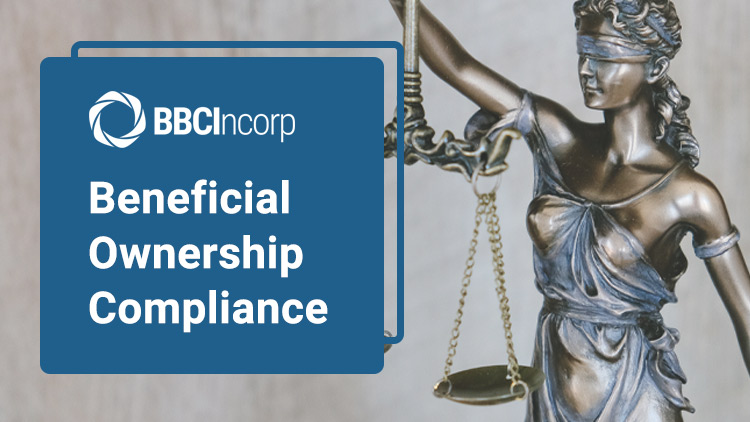
The Financial Crime Enforcement Network (FinCEN) is the current authoritative figure governing the beneficial ownership rule / CDD (Customer Due Diligence) rule for all qualifying legal entities. Its purpose is to serve as a direct deterrent to illegal financial activities such as tax evasion, money laundering, solicitations, etc. to create a more transparent global financing landscape.
However, questions are being raised by financial institutions (FI) and corporations worldwide regarding the new legislation’s effectiveness and scope of compliance. This article seeks to provide you with applicable instruction, presented in clear legal prose, on how to stay compliant.
1. What is the Beneficial Ownership Rule?
Beneficial ownership is a legal term that exists in multiple renditions of commercial law that refers to the individual/entity that has absolute control – directly or indirectly – over an organization, e.g, a trust, a foundation, or a company.
FIs are required to adhere to their own respective AML (Anti-Money Laundering) legislation which generally mandates the procurement and verification of the beneficial ownership information of the legal entity customers (reporting companies) upon opening an account. This is to prevent wrongdoers from using body corporate to open a bank account as a front for their illicit financial activities as the lack of clarity on true ownership has previously been the biggest loophole for them to exploit.
Furthermore, similar to other kinds of customer information that an FI will collect, beneficial ownership can be cross-utilized to assist law enforcement agencies with other matters such as identifying suspicious activity or determining Office of Foreign Assets Control (OFAC) sanctioned parties.
2. Who Has to Comply with It?

FinCEN’s Beneficial Ownership/CDD Rule stipulates that a financial institution must develop a written procedure to identify and verify information of “beneficial owner(s)” of any legal entity customers (reporting companies) whose accounts are opened after May 11, 2018, and to integrate it into their anti-money laundering programs.
With this statement, it’s essential to understand the two terms “beneficial owners” and “reporting company” in order to get a better grasp of the new legislation.
2.1. Legal Entity
A legal entity, aka “reporting company”, is broadly defined as an organization that has the legal structure of a limited liability company, corporation, or similar entity that is established by filing a formation document with the secretary of state or similar offices or formed under the laws of a foreign state that involves opening a bank account.
Under the CTA (Corporate Transparency Act), there are certain types of business entities that are excluded and exempted from the reporting provision. They include, among others, the following cases:
Exclusion Cases
- Business entities operating in industries with high regulations such as banks, credit unions, brokers, dealers, etc.
- Publicly traded companies
- Tax-exempt entities
- Sole proprietorships
- Unincorporated associations
- SEC-reporting companies,
- Registered investment companies
- Registered public accounting firms
The entities in the exclusion list do not have to substantiate their exclusion with beneficial ownership information. However, exempted entities still have to provide a completed form detailing exemption reasons signed by the NAP (Natural Authorized Person) and is to be submitted with the first account opened after the FinCEN regulatory date.
*Professional legal consultation is advised to fully be aware of a legal entity’s compliance status. Further reference on key points of beneficial ownership information can be found here.
2.2. Beneficial Owners
FinCEN defines beneficial owners under two ownership prongs, namely “ownership” and “control”.
The beneficial owner under the “ownership” prong is defined as an individual who directly or indirectly owns 25% or more equity interest within a legal entity. Identification of the beneficial owner under this prong is not required if no member with the specified amount of equity interest is present.
The “control” prong is reserved for a single individual with significant responsibility to control, manage, or direct a legal entity customer, this includes those with managerial titles such as Chief Executive Officer, Chief Financial Officer, Chief Operating Officer, President, etc. or any other role that performs similar specifications.
The current threshold for beneficial owners a reporting company is allowed to have is one for the lowest and five for the highest. However, this can change depending on different FIs and their discretions.
On a regular basis, a bank would solely rely on the beneficial ownership information given to it by the reporting company in question as legitimate clarification if it has no reason to believe that further probing is needed. However, a bank employee can file SAR (Suspicious Activity Report) – under the right circumstances – against any equity holders for active reporting avoidance if they are aware or have legitimate reasons to believe that the act is being committed.
Exclusion Cases
- A minor child (given that the child’s parent’s or guardian’s information is reported properly)
- A representative figure such as nominee, intermediary, custodian, agent.
- An individual acting as an employee whose control is derived solely because of employment status
- An individual whose interest within the legal entity is obtained through a right of inheritance
- A creditor of the entity that doesn’t qualify as a beneficial owner.
2.3. Applicant
Pursuant to the congressional amendments on January 1, 2021, made to the beneficial ownership reporting framework, reporting companies are required to submit information on individuals who are responsible for the registration/formation of such entities.
This individual is also subject to FinCEN’s beneficial ownership disclosure provisions and that any violation will result in criminal or civil penalties.
* Future enactment of new regulations may add or relieve legal responsibilities for any of the above-mentioned definitions.
3. What are the Reporting Requirements?

Qualifying entities will have to provide identifying information of its beneficial owners to FIs.
3.1. Beneficial Ownership Information
- Full legal name
- Date of birth
- Current residential or business street address
- A unique identifying number from an acceptable identification document or FinCEN identifier, if available.
Keep in mind that this is only the mainline regulatory requirements that most FIs have to follow and therefore, not exhaustive in terms of ensuring security. Auxiliary information is advised to be prepared ahead of time to be shown upon request. Some FIs may request the following in addition to the beneficial ownership information, e.g, license/ID information, percentage of ownership, residency status, etc.
3.2. Timeline for Compliance
The beneficial ownership rule/ CDD rule is already in effect since May 2018. However, there is still time for legal entities to re-evaluate their compliance status before the promulgation of new regulations – requested by the CTA – is passed via the Treasury by January 1, 2022.
For legal entities that are formed prior to the effective date of the new regulations, a period of two years will be granted to file the reporting requirements to FinCEN. Any legal entity that is formed after this will have to comply with reporting requirements upon registration/incorporation. Whichever case your business entity may fall into, any changes made to the originally submitted information are to be notified to FinCEN within a year.
3.3. Penalties for Non-Compliance
The CTA forces different penalties for reporting companies that neglect to follow its necessities or give incorrect or deluding data to FinCEN. Accordingly, any individual that submits announcing violations might be expected to take responsibility for fines up to $500 each day, not to surpass $10,000, and may look as long as two years in prison.
4. What Protocols Are There to Contain and Disclose the Beneficial Ownership Information?
Every beneficial ownership submission to FinCEN is stored in a secured and non-public database and has a 5-year reservation period after its termination.
Appropriate protocols are in place to prevent unauthorized disclosure of beneficial ownership information. FinCEN can only disclose such information upon request made from the following entities:
- A federal agency that performs its duty in national security, intelligence, or law enforcement
- A non-federal law enforcement agency authorized by the court
- A federal agency on behalf of certain foreign requestors under specified conditions
- A request by an FI subject to CDD requirements, with the consent of the reporting company/legal entity customer
- A federal functional regulator or other appropriate regulatory agency
As a response to the looming concerns over its less-than-stringent reporting provisions, prescriptive requirements are now being revamped and are expected to be promulgated by the Secretary of Treasury by January 1, 2022.
They will specify certain procedures, standards, and methods of governing beneficial ownership information along with the FinCEN Identifier to further reinforce its cybersecurity. We expect that this will come sooner than the expected arrival date so be sure to stay tuned for updates.
* Various provisions are made to address improper disclosure of beneficial ownership information, any violation from a requesting agency will be met with criminal and civil penalties.
5. What Does This Mean For Businesses?

Privately traded businesses with simple ownership structures are relatively easy in terms of verifying the beneficial ownership information. FIs can just check the entity’s company registry or request access to a beneficial ownership database consortium where the beneficial ownership information is kept.
Qualifying entities with various beneficial owners will have a harder time implementing the regulations as keeping up with updates and reporting timelines can be logistically draining.
This is most relevant to offshore companies with sophisticated legal structures with obscure terminologies that make verification a struggling ordeal for FIs.
The CTA is expected to reach full implementation by 2023, by then it would have had a solid database of beneficial ownership information readily available for rulemaking. The time leading up to this will inevitably involve additional legislative changes which can be hard to follow for legal entities with complex organizational structures.
One highly relevant solution for legal entities would be to implement a fully/semi-automated management system that streamlines the beneficial ownership information collection process. A good way is to repurpose the data governance feature of the (MDM) Master Data Management system to potentially create an up-to-date and authoritative beneficial ownership database.
As for financial institutions, greater efforts need to be made in developing a more reliable and robust legal entity customer risk profiles to enhance provisional power, either via implementing high-tech solutions or improving internal training.
Beneficial ownership reporting has come a long way in being at the forefront of international AML efforts. With active monitoring and innovative data administration, businesses can future-proof their compliance status and operate more efficiently across departments and sectors.
6. Conclusion
The premise of the beneficial ownership rule is to elevate accountability for all beneficial owners of privately held business entities and assist law enforcement agencies in creating a more transparent corporate governance in their respective jurisdictions.
Efforts are being made to standardize the reporting framework for the global judiciary landscape. Therefore, we expect the forthcoming revamped beneficial ownership legislation framework to address many ongoing comments within the general consensus. Hallmarks of which include the expansion of the beneficial ownership definition to include entities like money service businesses, and further elaboration on certain legislative terminologies.
Disclaimer: While BBCIncorp strives to make the information on this website as timely and accurate as possible, the information itself is for reference purposes only. You should not substitute the information provided in this article for competent legal advice. Feel free to contact BBCIncorp’s customer services for advice on your specific cases.
Get helpful tips and info from our newsletter!
Stay in the know and be empowered with our strategic how-tos, resources, and guidelines.


